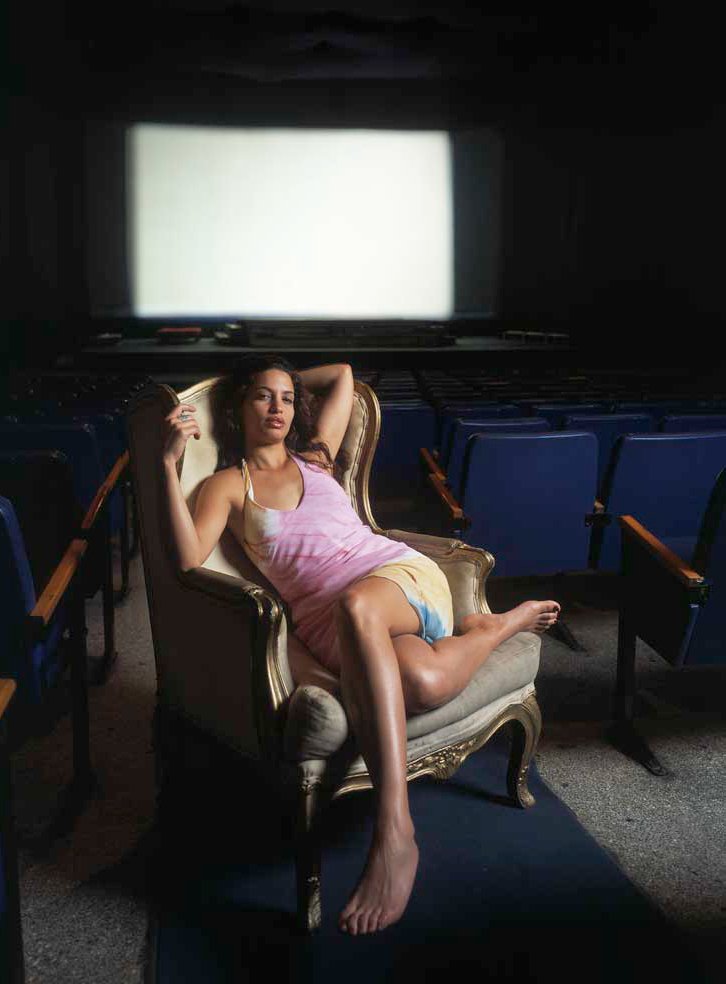
LAURA RAMOS
HABANEROS
-Encounters in Havana-
Photos Anders
Rising, text Maria Sandblad
Leaflet for Tokyo
exhibition, May 2006
“Two Swedes, the photographer Anders Rising and writer Maria Sandblad, have fallen in love with Cuba and Havana. Anders Rising already described his love in his book “Havana – The Space and the Spirit”, where Havana’s facades and interiors are portrayed. In “Habaneros – Encounters in Havana” we meet with its people, they who create Havana with their lives, with a pride, in themselves and in their city difficult to find elsewhere in the world. Captured by the discreet camera of Anders Rising, and sometimes by Maria Sandblad´s words.
People in the street, at work, or simply where they you find them. But you also get to know some of Cuba’s and Havana’s most distinguished artist: like the singer Omara Portuondo, the King of Salsa Issac Delgado, the artist Mendive, filmdirector JC Cremata, the poet Nancy Morejón, the young pianist Aldo López-Gavilán. And the minister of culture, the writer Abel Prieto, and many more. All of them part of a whole, of a dream, of a city by a turquoise sea that doesn’t leave anyone unmoved.”
“Havana. Habaneros. Hereditary elegance, brief encounters. The feeling of constantly being born anew. A meltingpot of dreams, memories and worlds – just like it´s cousin city New York – and a refugee for artists and adventurer of all times. A city by a turquoise sea, rich in culture, lived culture, reflected like nowhere else in its inhabitants, in the music, rhythms, forms and colours.
The photographer Anders Rising and writer Maria Sandblad, share a desire to capture and transmit this magical atmosphere. In their book ”Habaneros – Encounters in Havana” (Wahlström och Widstrand förlag/Fälth&Hässler), the reader meet with Habaneros of all ages through the magnificent photos by Anders Rising – from the first kiss and the waiting mothers at the clinic for risky pregnancies, to the old people at the ”Casa de los Abuelos”; crafts men, hiphoppers, lovers, the street sweeper, a police, a clown, a nun, a man of authority, the dandy that lingered behind.
But we also get to know some of Havana’s most distinguished artists in both images and words. Like the world-famous singer Omara Portuondo, the artist Mendive and the King of Salsa himself, Issac Delgado, who were all created from the rich humus of Havana, which at the same time they participate in creating through their art. The wonder kid, pianist Aldo López-Gavilán, with both God and skateboard in his music, the poet Nancy Morejón, the filmdirector JC Cremata, the Afro Cuban dancer Zenaida Armentero, the constantly seeking singer Gerardo Alfonso, and many others.
Get to know a city filled with, art, dance and music, saints and myths, vibrating with life behind the sometimes flaking facades. And get to know its people, Los Habaneros.”
PUBLISHING HOUSE: Wahlström och Widstrand Förlag, Stockholm, Sweden.
PRINTING HOUSE: Fälth&Hässler, Värnamo, Sweden
www.falthohassler.se , anders.ekberg@foh.se
FORMAT: 210 x 297 mm
PAGES: 144
PHOTOS: 105
TRANSLATION (first version): Maria Sandblad, revised by Cristina Fontoura
PHOTOS FROM THE BOOK:
www.andersrising.com ,
www.habaneros/havana.com (in progress)
CONTACT:
Maria Sandblad: mariasandblad@yahoo.se
Anders Rising: info@andersrising.se
”Havana and its inhabitants Habaneros, virtually vibrate with joy and mysteriousness. Joy, because people you meet in the book seem so full of life and curious… Mysteriousness because you never really get to know how everything actually is in Havana, as if you were travelling hrough a dream where one marvellous person after the other appear and catch the attention of the spectator... The ever present flaking surroundings are used as a soft framing in most of the portraits, and joined with the intense colours that mix with the wonderful Cuban light, it give the impression that people simply take life as it comes. Because they live in paradise…
They all have a dream. They are strong and they exist. A wonderful book on every level…”Para Siempre! Buy it!”
Cecilia Öfverholm, The MAGAZINE RESUME, Stockholm
HABANEROS
-Encounters in Havana-
PREFACE FROM THE BOOK
Havana has enchanted its visitors since time immemorial. While many lingered, the desire to return has remained with everyone. Is it possible to long for something that never existed, but simply is? An illusion, a play of shadows, a universe enclosed in the barking of a dog, in a bolero through an open window when the sun is at its highest.
Or do you become what you feel and what moves you, even though time and the world around, from which Cuba was spared for so long, have begun to make themselves noticed? Still, right at an intersection where roads, whose direction no-one really knows crosses, we encounter something which suspends the ordinary rules of life and which, without our noticing, discloses something new us.
Something unexpected, unexplored, or perhaps something intimately known. That which is so easily forgotten, which so often tantalizes us just out of reach at the constantly evasive horizon of everyday life, obligations, seriousness and longing. Suddenly it is right there, beneath the colonial colonnades of Havana, behind flaking facades, in the streets vibrating with life and unspoken promises, in silent portals and in the singing birds of shimmering green courtyards, in the sound of children playing and the sensation of a Sunday long ago. In the eyes of the people, in the hint of laughter, or desire, that at any moment can arise.
Because the greatest adventure is the people, los Habaneros, who so proudly possess their city in their every step, who constantly find themselves on a journey – through life, through the city, through their own dreams. Who regardless of the shade of the skin, background or future, greet everyone with a head held high and a daring look with an invitation: “Here I am!” And you too come alive, and the dance is there and the mystery that touches us lightly again and again, transforming granite into gold and precious stones, the past and time to an unbroken present. This is their life, their soil, their very breath!
The rebellious son of the estate owner who altered the course of history. The old fisherman who found his home on the other side of the sea, the writer who travelled through many lives while searching for his own, the minister, the little drummer boy, the dancer who is his dance. The artist who lives with the gods, the young woman waiting impatiently for what is to come come, the” santero”, the musician, the nun, the wanderer, the singer who conquered the world, already a grandmother. The woman who never leaves her house, but everyday reaches a place where no one else has ever been, in her dreams.
The girl in Havana, Habaneros and Habaneras, unknown or famous, your song, mysterious and enticing, unrestrained or melancholy, we want to share and disappear into. It is mine, ours, everyone’s! But here, with the sea, the sky and all the saints so close, it moves just beneath the surface, wanting to be seen, sung, conquered, lived! Perhaps it will take also me back home again, back to the absolute moment and the extatic unity I find in you, in the stars that illuminate the Malecón and in the city when it awakens. The sense of belonging, and yet being who I am. Of knowing, without understanding. A mystery. A journey, a riddle. But filled with life. Filled with you.
Sarai Cuevas – Celebrating her fifteenth birthday.
Sor Indira – The Nun in Havana.
Aldo López-Gavilán – With God and skateboard in his music. A classical wonder kid.
Laura Ramos – The New Star on the Cuban movie scene.
J C Cremata Malberti – Beauty and absurdism, Cuba´s most spectacular filmdirector.
Tomas Guilarte Guilarte – Modern dancer and innovative choreographer.
Sandra Ramos – Dreamy painter and installator with an edge.
Issac Delgado – The Cuban and the the Latin “King of Salsa”.
Abel Prieto – John Lennon-fan, writer and Cuba’s Minister of Culture.
Mendive – Magical master-painter of the Afro Cuban myths.
Oscar Reyes Echamendia – ”Santero”, the one who speaks with the gods.
Zenaida Armentero – Grande Dame of Afro Cuban dance.
Haila – The new Celia Cruz, a great singer to be.
Gerardo Alfonso – Singer songwriter, constantly seeking for new answers.
Tata Güines – The legend who transformed the conga into a solo instrument
Omara Portuondo – The singing star of Buena Vista Social Club
Nancy Morejón - Adored poet, with a universe of her own to transmit.
Carlos Diaz – Theatre magician, creating a visual feasts of the classical treasures.
Gerado Fulleda León – Dramatist, writer, father of the mythological ”Ritual theatre”
Pablo Armando Fernández – Writer, seeker, the foremost explorer of the Cuban soul.
*Laura Ramos
*JC Cremata Malberti
*Mendive
*Zenaida Armentero

LAURA RAMOS
”Her sensual glow has an almost stunning effect on the surroundings at Havana’s newest hub for the chic and cool, the glass framed Cafe Jazz with its open panorama in the Galeria de Paseo by the Malecón, where we meet. Still no show-off, no capricious diva, rather a nice and unusually mature Cuban girl. Well, more of a woman, who like the really great singers let you know that there is a lot more in store for you than what she chooses to give out for the moment; that secret range which enriches every word, every expression with an extra weight and timbre…”
“ - My career really took off like a rocket. I’ve already experienced the ecstatic happiness, the euphoria that invades you when everything is flowing just right. But I’ve also felt the emptiness after a film or a play, when all of a sudden there is nothing but an immense silence around you. I’ve realised that to know who you are, as a person, in life, on the earth, is more important than anything else, otherwise you might loose yourself completely in that ephemeral phenomenon called success. Which in reality doesn’t exist, and which definitely isn’t who you are…”
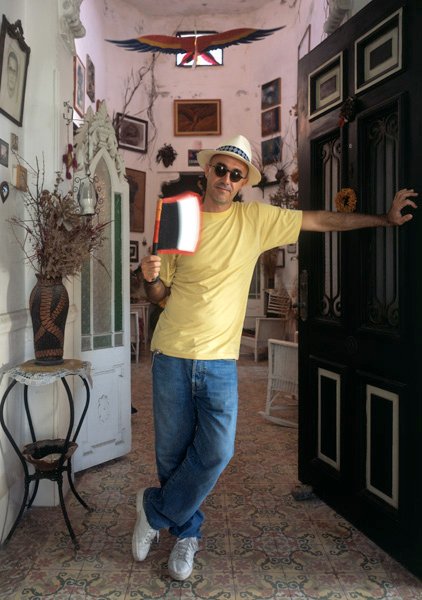
Juan Carlos Cremata Malberti
”… The sparkling intensity that surrounds him is felt even from a distance. Rushing cascades of words are streaming out, new ideas are ceaselessly succeeding each other. Here anything can come up and happen, as long as it is new, intelligent, street smart and provocative. And beautiful. Just as his debut film, Nada (”Nothing”), which of course doesn’t resemble anything done before – neither in Cuba nor elsewhere. Yet, or perhaps precisely therefore, it won the prize for the best debut at the annual Latin American film festival in Havana 2001…”
“ -…I just need to look down from
the terrace. Everything is happening with the curtain up, everybody is
participating. Incidents and events are magnified by those who are narrating,
you add and reduce to improve your story. It doesn’t matter if we all get
involved in a small lie – as long as it makes people laugh. And I enjoy it so
much. It has to do with surviving, with going through problems and difficulties
with your dignity and your joy of life intact. We are masters at that in Havana.
Much of the dialogues and what you see in “Nada” come from street conversations
I’ve overheard and comments from people around me.”
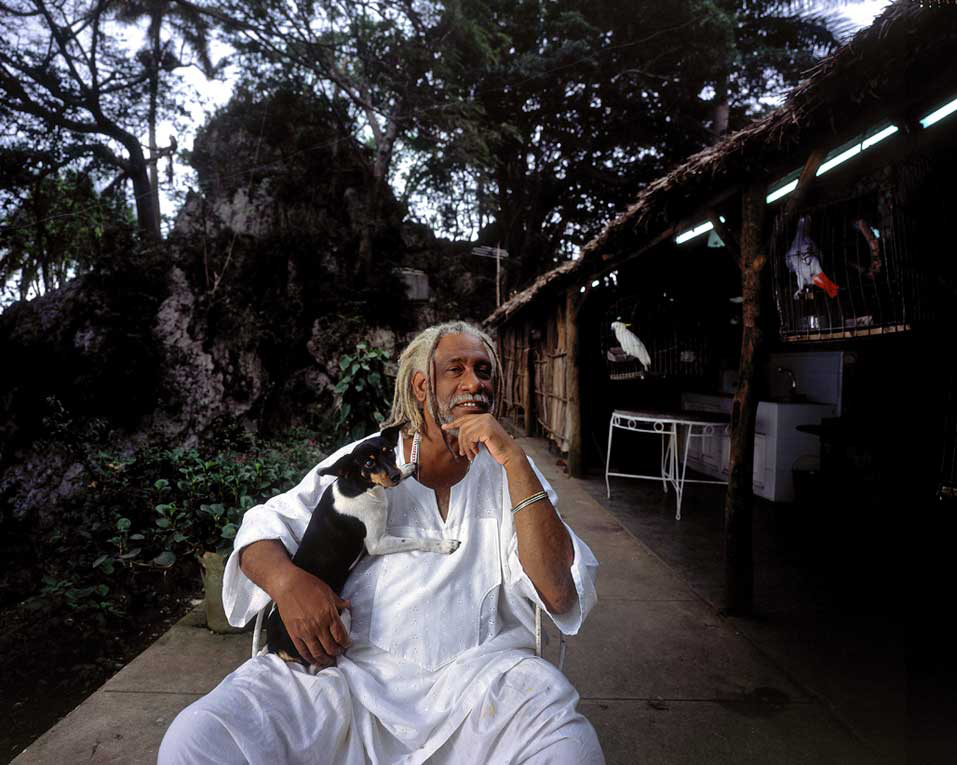
”…Suddenly he is sitting outside one of his studios by the aquariums, the dovecotes and all the cages with parrots in shimmering colours, a warm, newly washed mountain in a chair in front of a rock covered with trees that encloses us all like into an open cave; huge, dressed in white and immense as a prophet. Down by the slope ducks, goats, peacocks, cats, dogs and chickens are dimly glimpsed, as in a well managed fairy tale circus. A big smile greets us – welcome to my world!…”
”… - This is where I live, he says, enjoying our amazement before the multiplicity that is disclosed to us. The animals are my friends, I love to share my life with them. They make us come to a halt, and they teach us to see what surrounds us - the sun, the light, aromas, the mystical, that which is much harder to discover with human beings, we who think we are so brilliant, who think we are so able and know so much. Although sometimes it seems as if we don’t know anything at all!…”
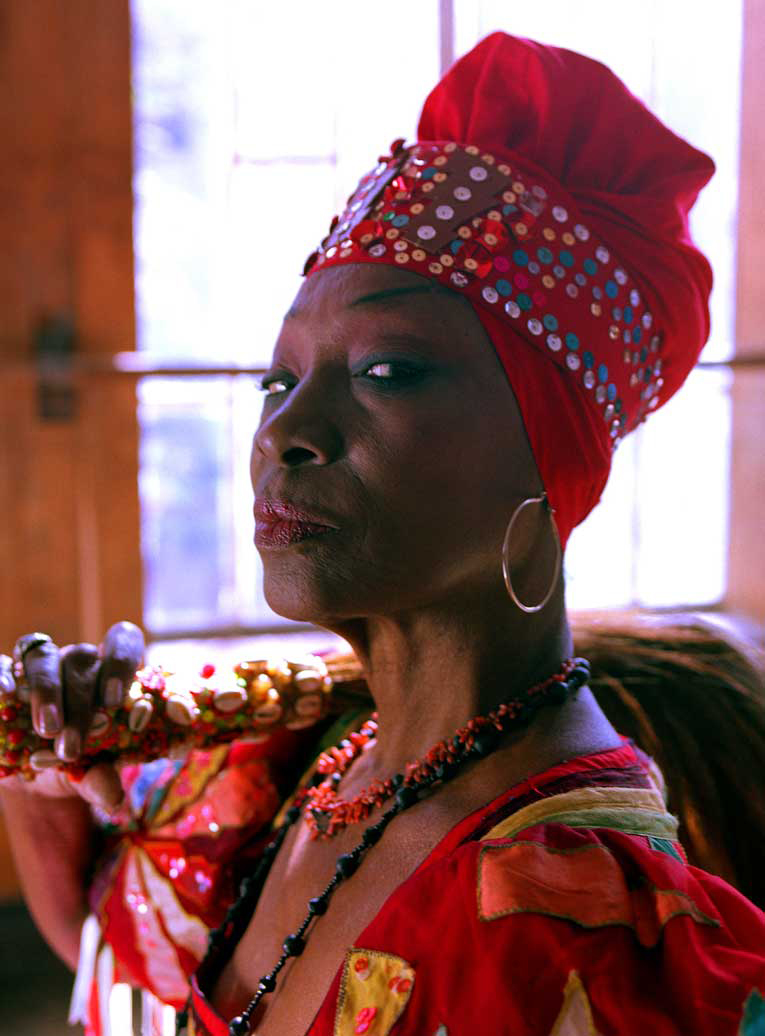
”… Her red dress with rainbow coloured handkerchiefs decorating her waist, is flying around the legs of Zenaida Armentero when she dances forth the powerful orisha, Oyá, the feared guardian of the cemeteries, with a temperament that makes the other saints of the Yoruba religion tremble, the only one who knows how to conquer the warrior god Changó – with her sweetness. Which she reveals only when it suits her, but not until no other escape remains…”
“… - Oyá is an armed warrior, but with the rainbow in her eyes, she explains gently after catching her breath again, and once more she changes over from the invincible to her own poised apparition. An irresistible paradox. Her colour is red, like her temperament, but she also embraces all the colours of the rainbow that belong to the sky, so enticing to us all. She makes me release something else, my own fire. How could I ever get tired of dancing her?…”
***
* Aldo López-Gavilán
* Omara Portuondo
* Abel Prieto
***
.jpg)
ALDO LÓPEZ-GAVILAN JUNCO
- Come in!
We’re going to see a ”wonder kid”, and who we meet is a cheerful young guy with curly rasta hair, dressed in baggy hiphop jeans. His inviting openness is felt as soon as we enter into the labyrinthical apartment ten floors up from Malecón, with the ocean and the open horizon on one side, and the city – surprisingly white from above – on the other.
Aldo López-Gavilán Junco, a classical pianist and a great musician to be on Christmas leave from Trinity College of Music in London, receives us with a big smile and a plain ”quieren café”? He looks as if he has lived his life on a skateboard, or in a pair of fast rollerblades, his eyes are laughing, his face relaxed, soft and young. But this is a Caribbean Mozart, or Keith Jarreth, who sang before he could speak, who composed his first piece for the piano at the age of five, who made his debut as a soloist with the 13th piano concert by Mozart at twelve and interpreted Prokofjev´s 3rd concert for piano and orchestra with Cuba’s leading Symphony Orchestra at the age of 17.
Scarcely eleven, at a huge UNICEF-concert in The Hague with young talents from all over the world, he suddenly realised that the piece he had prepared was too long, so instead he started to improvise freely from all the music he had lived with and played up to then. Terrified to begin with, but becoming more secure with each new idea and impulse. At the end of his performance the audience were standing up, shouting with joy!
- I mixed classical pieces and música popular, jazz, pop, rock folklore – anything that came into my mind, he says, still filled with wonder, as if it had just happened, and without words he invites us even closer to himself. Finally I began to sing too, ritual Yoruba sounds from my memory, without knowing their meaning or where I was going to land. And in the midst of it all, when the fear left me and I heard the ovations from the audience, I knew that this was me, my way of playing, my music! Like finally being born. It is still one of the happiest moments in my life.
The intense midday sun and the reflections from the sea are softly filtered through the dark wooden blinds of the living room. Islands of green plants are dimly shimmering in the corners, like floating chords that lingered behind. Surrounded by Cuban contemporary art, awards and trophies: The grand piano. Aldos´s playmate, friend and companion through life.
- Unfortunately it’s being repaired, otherwise I would have loved to play something for you instead of just talking about my music.
His tone enviably free and without reserve, as if talking and playing were only two, just as easily reachable, sides of the same coin. His hair is moving, everything is moving, he laughs and shares himself without anything to defend, instantly ready to meet whatever is arising and brought to life. Yet there is an unusual stillness around him, as if we had always been friends, as if he had already found his way home. Perhaps he has never left paradise.
His mother a pianist, a famous piano tutor and his first teacher, his father a famous conductor and composer, his elder brother a virtuoso on the violin – there was never any doubt that Aldo too would start with the great masters, the fundamentals and the technique. His talent was obvious to everyone.
- A life outside music, classical music, just wasn’t there. Never was, not even the thought of it, he says in his smiling voice, resting comfortably in himself.
Ever since Aldo composed his first piece he has continued to create his own music. Titles like ”To my beautiful young brother”, ”The story about the little girl who gave time back to time”, show an unchanged love for the childhood landscape, and for life, just like the music itself. In ”About castles, princesses and…” the young teenager is glimpsed in the playful changes of moods. With exquisite balance, ever since the transforming concert in The Hague, his music has been enriched with the full spectra of rhythms, forms and colours that Cuba is infused with – from colonial habaneas and contra danza to bolero, salsa, Yoruba rhythms and son, everything that reaches an inner point in him and demands to come alive, which makes his music just as Creole and born out of encounters as the food, the architecture and the Cubans themselves.
- In Cuba our music is a natural part of living, impossible to separate from the rest of life, he says, while scratching his sleepy, tousled little dog on its tummy. It always surrounds me here, like an ever-present nourishment. Even if you adore Chopin you dance to Los Van Van and Issac Delgado. It’s true that I grew up with classical music, but in our family we have always listened just as much to our great soneros and dance-music as to Beethoven and Tjajkovskij.
During a visit to Spain Aldo finally and fully discovered flamenco, which led him on to Arabian and Indian music, New Age and World music, which also nestles into his music that seems to come dancing out on its own accord when he is playing, with his voice as an extra spice on top. Or inside. And of course the unavoidable gods Bach and Mozart as well. Although it is the Russians that are closest to him, Stravinskij and Rachmaninov, with their intensity and richness of emotions, he says. And Ravel, his silences and sudden steps. While he himself comes closest to who he really is when he is playing.
- I always come back to myself at the piano. There I know I can express what I have inside. I give myself the same freedom as a jazz musician to improvise and mix in the spur of the moment, but the foundation is always the classics. At my concerts the audience comes from both sides - some to hear me play classical music, others to hear jazz. Both groups have to open up to something they would have otherwise missed, and that’s exactly what I want.
He is silent for a while, making himself available, waiting for what is to come, like someone who is eager, but still taking his time. An unusual ”wonder boy”, and an extraordinary 20 year old. Who is he by the way? He seeks, searches, and his laughter makes his rasta curls fly around him again.
- Who I am… hmm, I don’t know really... I think I am a rather peaceful person, creative, and a thinker, he starts a little tentatively. I can’t really say what I’m thinking about , but I think a lot! That I know for sure. And I have lots of love inside of me.
He stops for a moment, a little embarrassed. Picks up the rhythm again and continues:
- I want to convey something beautiful to others. As a musician one is like an instrument, a channel between the earth and the unlimited, some call it music, others call it God. My dream is to make people feel something of that boundlessness I experience myself when I’m playing, when the music disappears and something else is there. Just like when I watch the sunset and all the colours over the ocean from our living room window. That too is music.
He puts on his first CD. A small sample before we leave, filled with rhythms, openings and surprises, of both skateboard and God. And this silky stillness from the piano that comes and goes like the afternoon breeze from the sea through the wooden blinds. Aldo closes his eyes and disappears into his own tunes, and once more he invites us without words to come along. We travel in gentle, unexpected circles, through different worlds and fields of stars, while the afternoon sun is gilding the rooftops of Havana and dusk is approaching. We return reluctantly, and leave the labyrinthical apartment with something we didn’t have when we arrived. Perhaps a dream on it’s way to be fulfilled. Or a reminder of it.
***
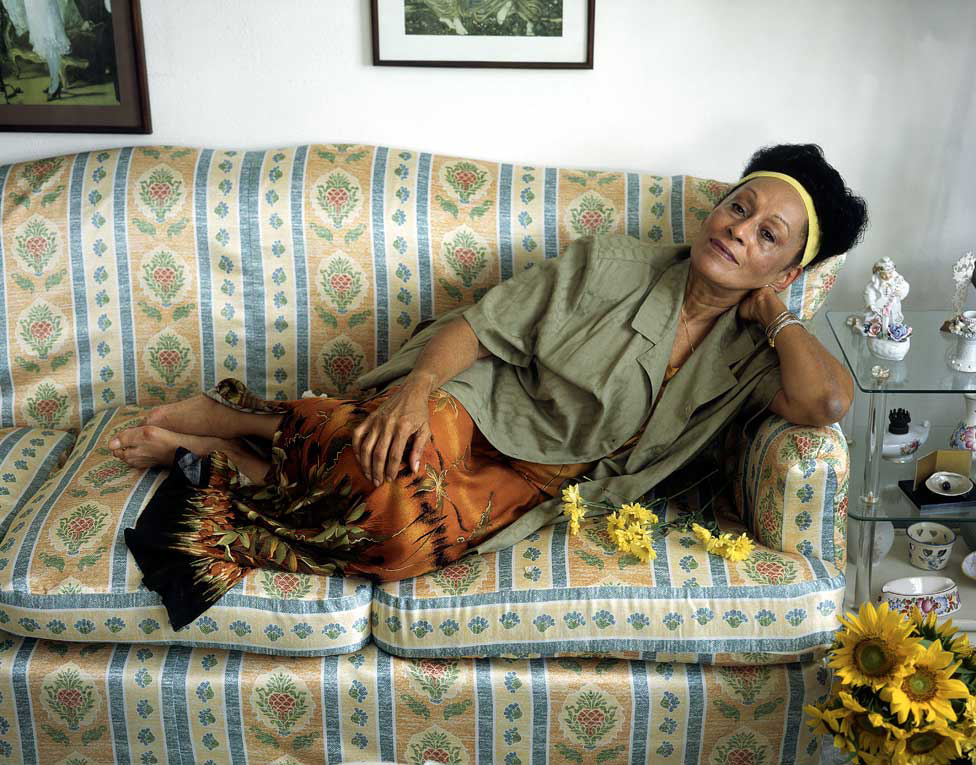
OMARA PORTUONDO
What I see is not the Star, she who first became a favourite singer in Cuba, who at the age of a grand mother conquered the world as the singer of the Buena Vista Social Club, admired by everyone for her voice, her beauty and for her enviable sensuality. But her hands. Exquisitely shaped, graceful, almost painfully fragile, as if without any defence. When she moves them you can almost see the cloud of lace that ought to frame her petite figure in the centre of a room filled with light. A cherished home in golden shades, adorned with memories, beautiful things and floating angel wind chimes. In the big vase by the sofa an armful of sunflowers, I am so glad I managed to find them this morning. “My favourite flowers”, says Omara Portuondo and gives us a radiant smile. “Thank you for coming!”
- I am a typical habanera, a mulato woman, the daughter of a black man and a white woman. My grandfather was a Spanish military and my grandmother a slave. That’s how our special Cuban race was born, consisting of whatever little remained from the native Indians who lived here when the Spaniards came, the Africans and the Asian immigrants who were lured to Cuba when slavery ceased.
- I was born and raised at the corner of the streets Senja and Castillejo in Centro Habana, a neighbourhood filled with music, musicians, painters and artists, where you were neither in need nor particularly well off. Sooner or later all the great musicians of that time stopped by, like Miguelíto Matamoros and Benny Moré, you always heard music from somewhere. But it was my parents who taught me to sing. They always sang when they were cleaning, cooking or doing something in our home – one from the kitchen, the other from the hallway, one started, the other followed. They really loved each other. My mother was fired from her job when they found out she had married a black man. It was different then. But to them love was the most important thing in life, they were happy with us five children and they didn’t long for anything else.
- And that’s how it is, without love everything comes to a stop, withers and dies, no matter how much money you have. Love makes everything grow. The first song they taught me was the bolero Veinte años, which I associate with that warm feeling of joy and childhood, with the unity of our family. I always end my concerts with that song, as a tribute to my parents and to what they gave us.
- In our building there lived a young artist, and a cigar-maker, who was also my godfather, who had his little business in the apartment they shared. As a child I loved to sit there and watch them work, and I´ll never forget the light, the silence, the artist by his easel with his brushes and tubes, the paintings that slowly took form, and the proud, serene movements of my godfather’s hands when as a magician he folded and rolled his perfect cigars. Sometimes I was asked to help him to tie the girdle, and for a few moments I was part of the almost magical power in that room. The name of the artist was Alberto Peña, he got tuberculosis and died young. But his paintings are still alive.
- Our block also had its own comparsa, one of the best in Havana, and throughout the year they were rehearsing and preparing for the carnival. When they were dancing along the streets in their glittering costumes with the pounding tambores in the lead, I was always running after the carnival parade, without permission, longing to join the dance. It seemed so exciting to be a grown up.
- We have a very intimate relationship, my city and I. When I started touring and got to know the other parts of Cuba, I realised they all had their beauty. But Havana, with its special mixture of people and atmospheres, is my home, what made me who I am. I’ve been singing for as long as I have lived, I never wanted to be anything but a singer. Except perhaps a cigar roller. But I wanted to become a ballet dancer too, and an actress, and my parents put me in a performing arts school. But for the ballet classes they only admitted white students, that’s how it was then, but not anymore. So instead I took private classes after school, and just as I dreamed as a child, I first became a dancer and later on a singer. My own satisfaction and the love from my audience are my most precious rewards, even if I have often worked tirelessly.
- When I sing I see colours; the colours of the landscape, the colour of people’s skin, their eyes, and I paint them with my voice. When I sing Siboney for instance, which in reality tells the story of a man waiting for a woman, while the title is also the name of one of our native Indians tribes, I see their huts, their canoes glilding on the water, I can feel their freedom and the pain that is waiting for them. But most of all I see the colours. And the landscape, the nature, which for each year that goes by becomes more important to me.
- To me Cuba is the best place there is to grow up and live. I love our optimism, our wit, our capacity to keep on struggling, no matter what difficulties we are going through, always a laugh within reach, a joke or a few words to disperse the sorrow and make everything sparkle again. I enjoy the game between men and women, that constant readiness to measure our strength, for instant seduction when you look at each other. And I love the sea, the sun, the palm trees, our tropical nature. Can you find a better vitamin? Apart for music, nothing makes me as happy as nature, that’s where I get my strength and my inspiration from. ”Soy muy romántica”.
- Our music reflects this nature, our special temperament, and we really seem to succeed in transmitting it to our audience. Sometimes after a concert people haven’t only thanked me for giving them back their joy, they have thanked me for giving them back the very desire to live! What can you feel except an enormous gratitude for the privilege of living in this blissful energy, and for the gift of being able to pass it on to others, as ambassadors for the Cuban culture.
- Cuban culture by the way, it isn’t simply what you see, hear or read with a label that says “culture”. It is just as much – or perhaps even more – our way of walking, talking, moving, enjoying each other and all the small and big joys in life, our way of caring for each other, of dancing, making love, the food we eat, the mojíto we mix. The rhythm which is present everywhere, all the time, even when we crush the garlic in the mortar for the sofrito to flavour our black beans: dunk-dunk-dunk dunk-dunk.
- Every artist dreams of something new to conquer. Cuban music was already known to the world when Buena Vista Social Club had their break-through. As early as in the thirties people were singing El Manicero all over the globe, later came the mambo and all the other rhythms. And the salsa. Our music always had a strong impact on people outside Cuba, and personally I was longing for the opportunity to give our whole treasure of music to the world. Which I finally did, thanks to Ry Cooder, Wim Wenders and Nick Gould, and of course, through the Buena Vista Social Club. Another dream that also came true.
- But despite all my successes, the greatest moment in my life continues to be when I gave birth to my son Ariel, who is now my agent and best friend. Once more nature that proves to be the greatest force in our lives. I don’t have a big family any more, it’s just him, his wife, my granddaughter and me. But we are all very close.
- I’ve achieved everything I ever dreamt of as a child; I became a singer, I am making others happy through my art, I have my son. May life allow me to continue to make people happy for many years to come. Including myself.
- Nevertheless, I always have the same doubts, the same dizzying feeling before appearing on stage: Will the audience receive me, will I reach them, will the applause come? And apparently this is how it must be in order to touch that innermost core in yourself to be able to give it all. Although those who know me say that I have something left that is only mine, my own secret, unreachable for others, perhaps even for myself. Something which you can perceive, but not really see. Maybe that´s the reason why people still want to listen to me, why life still seem like an unending adventure …
***
ABEL PRIETO
A yellow fairy castle in the heart of Vedado, a santera to be, dressed in white, in the reception. The walls covered with Cuban contemporary art, with the open window towards the greenery of the street and the sea further down like a painting in luminous colours among the other art works. Three chess boards, five telephones, a big table strewn with books, papers, personal things and some sweets. Not a single piece of office furniture, no suggestion of risks, central committees or difficult decisions. Beneath the table a pair of worn Cuban slippers of the kind that always mark the transition from public to civil life in Cuban homes.
Not an ordinary Ministry or office of a Minister. But it isn’t an ordinary Minister either who enters the room with long strides, almost two hours late, the writer Abel Prieto, moreover Cuba’s minister of Culture and, according to what I’ve heard, the possible crown prince to Fidel; tall, wonderful and so nice! Dressed in jeans, an open shirt and a big leather jacket, as if looking for a surprise, for something new to get involved with and investigate. With both hands extended in a greeting, and the direction already marked out.
- What a terrible day, he puffs and disappears into the huge rocking chair next to his unconventional desk, visibly relieved to have reached his destination. Meetings and reunions since early morning. I´ve hardly had the time to breathe.
Not the slightest trace of barriers or diplomatic distance. His joyful brown eyes behind his big pilot glasses that instantly zoom me in, linger, with an invitation to step out of the official protocol, or the fear of it. One immediately feels accepted and incorporated by this long-haired minister, who rather reminds me of a rocker from the sixties, or a cowboy, than of someone who recently turned fifty, just became a grandfather and, according to what some people say, is the fifth man in the hierarchy of Cuban politics; like a family member, or at least a friend on an eagerly awaited visit. Does he act like this with everyone? I begin to understand why his secretary is so formal and reserved.
- And to top it off, it’s cold.
He blinks and nods out through the window towards a non-existent cold-front, which at the most slightly ripples the waves down at the Malecón. A Saturday afternoon, soon after four, the weekend, his family and private life is waiting for him. Abel Prieto leans back against the dark jacaranda with his leather jacket still on, and rocks gracefully back and forth on the bent rushers, just like the Cubans have done throughout the ages on verandas and in living rooms, in cities and in the countryside, in order to quiet the mind through this the most archetypal of movements, and return to the peace that is so easily lost in the daily frenzy that breaks loose every morning,
”I practically live in this chair”, he says contentedly. His long legs continue to keep pace while he tries to convince the photographer to let go of the idea to take the photo on the hallway stairs, “too solemn”, and instead take his picture where he is sitting – despite the marvellous colonial architecture we will be missing out on. ”Here I’m no longer the official person, but more myself, the writer Abel Prieto, who also happens to be a Minster. Please, can’t we take the picture here”?
His voice warm, a little mischievous and embracing, just like himself. I almost feel like climbing into the rocking chair myself. The first Polaroid attempt is scrutinised. He points out that he most of all looks like someone from Buena Vista Social Club, whom he certainly adores, but whose members after all are considerably older then he is. ”Do I”, he asks and fastens his eyes severely in mine. ”Yes, actually you do”, I dare to venture, responding to the challenge, and we all share a laugh, freely and without holding back, just like before the high school dances a long time ago, but with no fear for how the night will end, as if everything was done and completed exactly as it is. Just like the photo that finally is taken.
And how did he end up here? Abel Enrique Prieto from a family of teachers from the eastern tobacco province, Pinar del Rio, who never wanted to be anything but a writer, although he also started out as a teacher, in Spanish language and literature, at Havana’s University. Who wrote his first story as a 19 year old student, awarded as the best of that year. Who soon even became a prestigious essayist, specialised in José Lesama Lima, at the time a questioned writer but nowadays almost a cult object. I silently wonder whether Abel’s points of view might have contributed to this shift.
After nine years as a very young chairman of the UNEAC, the interest organisation for all Cuban artists, where he succeeded the Nobel prize candidate Nicolás Guillén, and after four years as a vice-minister to his predecessor, the hero from the sierra, Armando Hart, seven years ago Abel Prieto became the youngest ever and a tremendously cherished Cuban Minister of Culture. He can’t really explain why he has ended up in all of these leading positions.
- People have chosen me, and trusted me, and I have accepted, he tries. But obviously there must be some part in me that wants to be out there, in the front row, where the struggle is taking place and where decisions are being made, he finally admits.
Yet he is a writer more than anything else, he specifies on a direct question. Five years ago his latest novel, ”El vuelo del Gato” (”The flight of the cat”) was published, his first novel since he became a Minister. A juicy fable about the passing and the non-existence of time, magical encounters and a world inhabited by saints and crooks, union leaders and hippies, the living and the dead, with the plot located tin Marianao, the most diverse and colourful, and culturally the richest part of Havana, where the tales and the myths are still very much a part of life, and where he himself lived for some years in his youth. With a glimpse of John Lennon, his great idol, to whom he has dedicated a park in Havana, Parque Lennon, on the cover.
- That novel was extremely important for me to write. I hadn’t published anything in ten years, and I was very concerned about how it would be received. But the reception has been overall positive, especially among my own generation, we who were young in the sixties, who lived with music of the Beatles and the dream to change the world. That was particularly satisfying for me.
- Unfortunately my job as a minister takes up most of my time, twelve, thirteen hours a day every day of the week, except Sundays, but then there is often some cultural activity I have to attend, he continues a little resigned, after a short intermission. I don’t know any writer who can afford to live exclusively from their writing, still they have more ordinary side jobs, as teachers, lecturers or columnists, I have only myself to blame.
- But in the bitter tastes of leaving aside my own creativity, there is also the sweetness of having a true dialogue with Cuba’s artists, the feeling of really getting something done. Otherwise I wouldn’t be sitting here. We have regular meetings, we know each other, I am not a distant figure far away in some political haze, but someone you can turn to in matters great and small. My, and the entire ministry’s aim, is to always defend the interest of the artists, to some extent is also my own interest, that all decisions shall be made from their point of view. Not the other way around.
Which actually seems to be true. Almost every artist I’ve met seems to be on their way to, or just back from a meeting with the Minister of Culture. El Ministro, as they say to me, among themselves he is just Abel. Frames have broadened, doors have opened, and I know that the state commissions have increased considerably, despite the economical situation. For a moment he disappears into his own thoughts again.
- But it is a constant struggle not to stiffen, to avoid becoming a bureaucrat, to continue to meet new cultural processes without rigidity, he continues thoughtfully after another little rocking intermission. That is the most important thing of all, that I never loose my ability to welcome what is new. And that I continue to write myself.
Abel Prieto continues to rock his chair gently. The half an hour we got is by far exceeded, and I have long since forgotten that I actually have a man of authority in front of me. We continue to talk about the still undefeated heroes of our youth, Los Beatles, about Havana’s annual tribute to the group on the 8th of December, where he himself has had a finger in the pie, and where the music of The Beatles is played by Cuba’s leading musicians all day long by the statue of John Lennon – with an amazing resemblance to Abel Prieto himself – in Parque Lennon, in the centre of the city. About rice cakes and sensitive stomachs. About Cuban culture and its penetrating power, which – apart from the quality - he attributes to its vitality, to the multiplicity of temperaments and experiences that Cuba consists of, and that music aside, it is in the visual arts where exciting new things are happening right now.
About the importance of a writer’s discipline and how the day actually has more hours than you think, about how he is up at his computer long before dawn, and that his next novel, “Noche en Moscú” (”Night in Moscow”) is turning out to be a detective story. About our favourite animal, the cat, and about the strange and astounding sensation in growing older yourself, although it still feels as if life has just begun. Sometimes we are quiet, the telephones are ringing, someone knocks at the door, but that is all entrusted to his secretary.
Finally it’s time to leave. With a signed cat book in my hand, I am swept away into his extended arm on our way out through the door to his fairy like wife and the second hatch of children, who are waiting outside. The ministry is empty, except for the guards. Abel Prieto´s week of work and my interview that disappeared and got transformed into something else, are over. The night and Havana is waiting for us all.
?Lo hemos pasado muy bien, no? he says with a smile, but also inquiring, after the showering of goodbye kisses from him and his whole family, as if he were really looking for a confirmation of the unexpected concord, that makes me sway and almost see the stars.
-
Didn’t we have a good time?
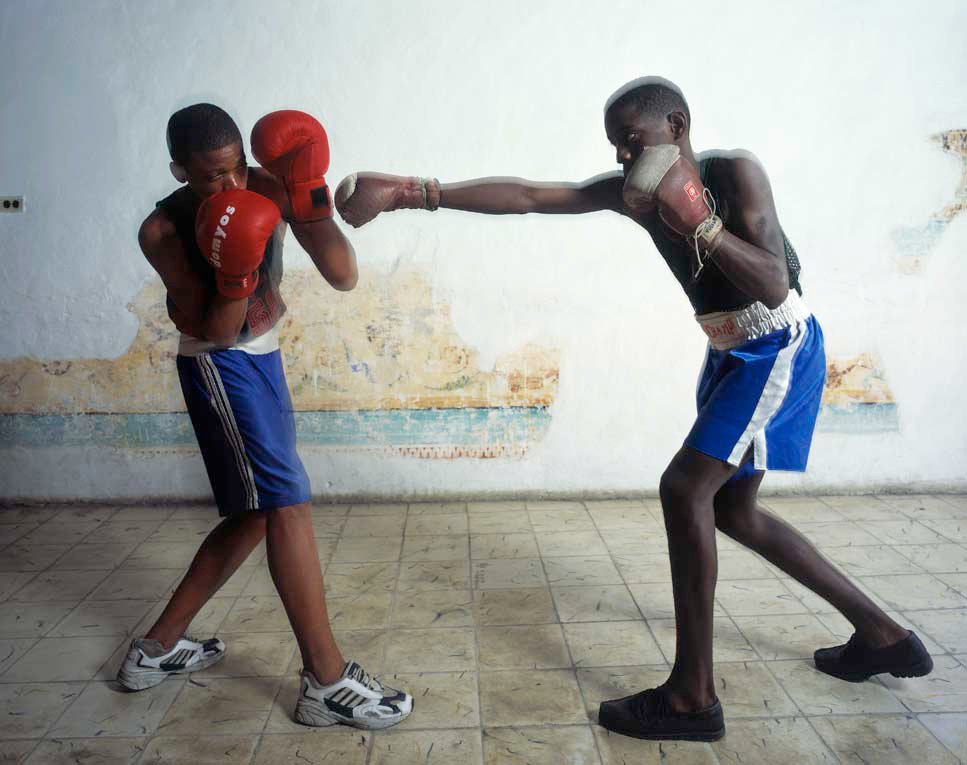
Boxing Boys
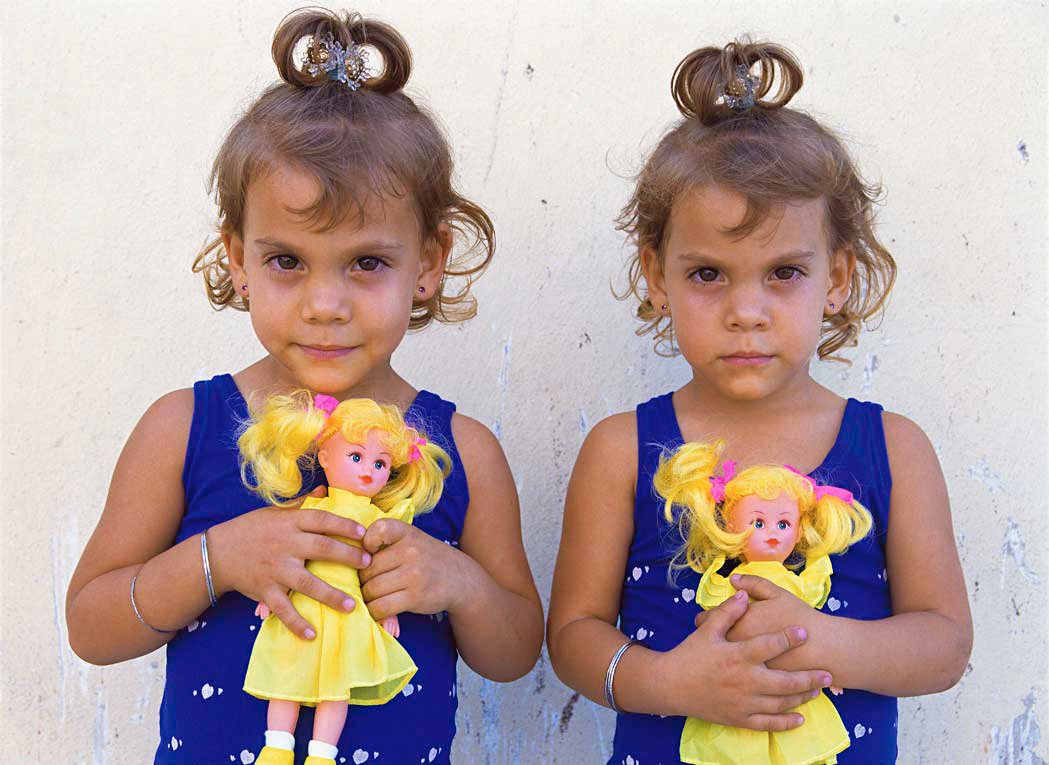
Heidi and Leidi
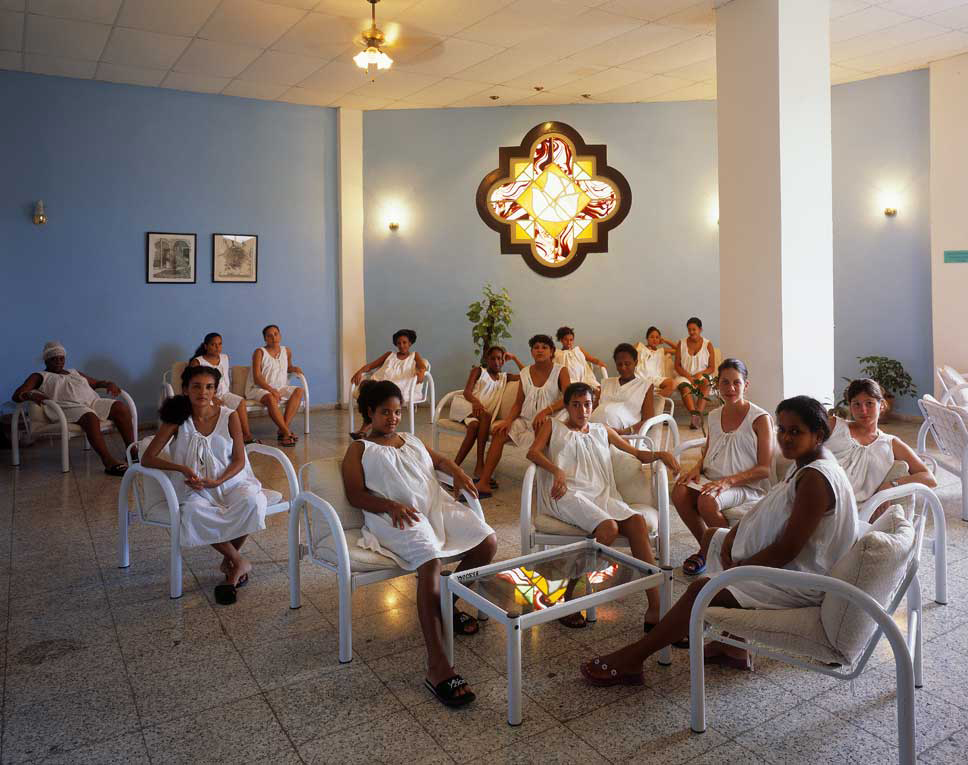
Casa de maternidad
Juan Carlos Cremata Malberti
***
HABANEROS
PREFACE IN SPANISH
Desde tiempos inmemoriales La Habana ha cautivado a sus visitantes. Muchos se han quedado, todos la han añorado. ¿Es posible añorar algo que no ha existido, algo que solo es? Una ilusión, un juego de sombras, un universo encerrado en un ladrido de perro, en un bolero a través de una ventana abierta al sol de mediodía.
?O será que te conviertes en lo que sientes, en lo que te conmueve, a pesar de que el tiempo y el mundo exterior que tantos años ha dejado en paz a la ciudad y al país, comienza a hacerse presente? Todavía, cuando de pronto se cruzan los caminos cuyo rumbo exacto nadie realmente sabe, seguimos encontrando algo que anula las reglas de siempre y que imperceptiblemente nos abre a algo nuevo.
Algo inesperado, ignoto, o mejor algo intimamente conocido. Aquello que tan fácilmente se olvida, que tan a menudo nos burla allá, fuera de alcance tras el horizonte siempre huyente de lo cotidiano, deberes y anhelos. De repente aquí está cerca, bajo los arcos de columnas coloniales de la Habana, detrás de las fachadas desconchadas, en las calles que vibran de vida y de promesas sobreentendidas, en portales silenciosos y en el trinar de los pájaros en el verdor de los patios, en el sonido de los niños que juegan y en la sensación de un domingo de hace mucho tiempo atrás. En los ojos de la gente, en el resplendor de una risa, o el deseo, que en cualquier momento puede surgir.
Porque la aventura más grande es el hombre, los habaneros, que tan orgullosamente poseen su ciudad en cada paso, que siempre están de tránsito – por la vida, por la ciudad, por sus propios sueños. Que, prescindiendo del color de la piel, pasado o futuro, encuentran a todos con la espalda erecta y una mirada que invita: “¡Aquí estoy!” Y tú también naces y el baile y el misterio que nos roza, cada vez más y que transforma piedras berroqueñas en oro y piedras preciosas, el pasado y el tiempo en un presente sin fin. Esto es su vida, su humus y su oxígeno!
El hijo rebelde del terrateniente que transformó la historia. El viejo pescador que encontró su casa al otro lado del mar, el escritor que atravesó varias vidas camino a la suya, el ministro, el muchacho enamorado de su tambor, el bailarín que es su baile. El artista que vive con los dioses, la mujer jóven esperando impacientemente por lo que va a venir, el santero, el músico, la monja, el callejero, la cantante que ya abuela conquistó el mundo. La mujer que nunca sale de su casa, pero que cada día llega adonde no llega nadie, en sus sueños.
La Muchacha de La Habana, Habaneros, Habaneras, desconocidos o famosos, en su canto misterioso y tentador, indócil o melancólico, queremos perdernos, queremos compartirlo y hacerlo nuestro. Es mía, nuestra, !de todos! Pero justamente aquí, con el mar, el cielo y todos los santos tan cerca, está en la misma superficie, quiere ser vista, cantada, usada, !vivida!
Quizás a mí también me devuelve a mi misma, a aquel momento absoluto y la compenetración vertiginosa que encuentro en ustedes, en las estrellas que se encienden sobre el Malecón y en la ciudad cuando se despierta. La sensación de pertenecer, sin dejar de ser quien soy. De saber, sin comprender. Un misterio. Un viaje, un enigma. Pero lleno de vida. Lleno de ustedes.